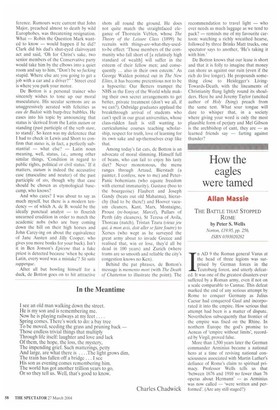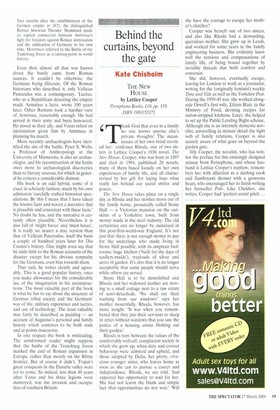How the eagles were tamed
Allan Massie
THE BATTLE THAT STOPPED ROME by Peter S. Wells Norton, £19.95, pp. 256, ISBN (1393020282 In AD 9 the Roman general Varus at the head of three legions was surprised by German forces in the Teutoburg forest, and utterly defeated. It was one of the greatest disasters ever suffered by a Roman army, even if not on a scale comparable to Cannae. This defeat marked the end of any serious attempt by Rome to conquer Germany as Julius Caesar had conquered Gaul and incorporated it into the empire. How serious that attempt had been is a matter of dispute. Nevertheless subsequently that frontier of the empire was fixed on the Rhine. In northern Europe the god's promise to Aeneas of 'empire without limits', recorded by Virgil, proved false.
More than 1,500 years later the German commander Arminius became a national hero at a time of reviving national consciousness associated with Martin Luther's defiance of Rome's claim to spiritual primacy. Professor Wells tells us that 'between 1676 and 1910 no fewer than 76 operas about Hermann' — as Arminius was now called — 'were written and performed'. (Are any still staged?)
Two months after the establishment of the German empire in 1871, the distinguished Roman historian Theodor Mommsen made an explicit connection between Arminius's fight for freedom against Roman domination and the unification of Germany in his own time. Mommsen referred to the Battle of the TeutoburQ forest as a turning-point in world history.
Even then almost all that was known about the battle came from Roman sources. It couldn't be otherwise, the Germans being illiterate. Of the Roman historians who described it, only Velleius Paterculus was a contemporary. Tacitus, who as a Republican detesting the empire made Arminius a hero, wrote 100 years later. Other Romans took a harsher view of Arminius, reasonably enough. He had served in their army and been honoured. He posed as their ally. and Varus relied on information given him by Arminius in planning his march.
More recently archaeologists have identified the site of the battle. Peter S. Wells, a Professor of Anthropology at the University of Minnesota, is also an archaeologist, and his reconstruction of the battle owes more to archaeological discoveries than to literary sources, for which in general he evinces a considerable distrust.
His book is an odd hybrid, some of it exact in scholarly fashion, much by his own admission 'carefully crafted historical speculations. By this I mean that I have taken the known facts and woven a narrative that is plausible and consistent with these facts.' No doubt he has, and the narrative is certainly often plausible. Nevertheless it is also full of 'might haves' and 'must haves'. It is really no nearer a true version than that of Velleuis Paterculus, itself the basis a couple of hundred years later for Dia Cassius's history. One might even say that he adds little to the Roman accounts of the disaster except for his obvious sympathy for the Germans, even bias towards them.
That said, he writes clearly and agreeably. This is a good popular history, once you make allowances for the considerable use of the imagination in his reconstructions. The most valuable part of the book is what he has to say about the structure of German tribal society and the Germans' way of life, military experience and tactics, and use of technology. The least valuable may fairly be described as padding — an account of Augustus's personal and family history which contrives to be both stale and at points inaccurate.
In one respect the book is misleading. The uninformed reader might suppose that the battle of the Teutoburg forest marked the end of Roman expansion in Europe, rather than merely on the Rhine frontier. But of course it didn't. Trajan's great conquests in the Danube valley were yet to come. So indeed, less than 40 years after Varus and his three legions were destroyed, was the invasion and occupation of southern Britain.



























































































 Previous page
Previous page